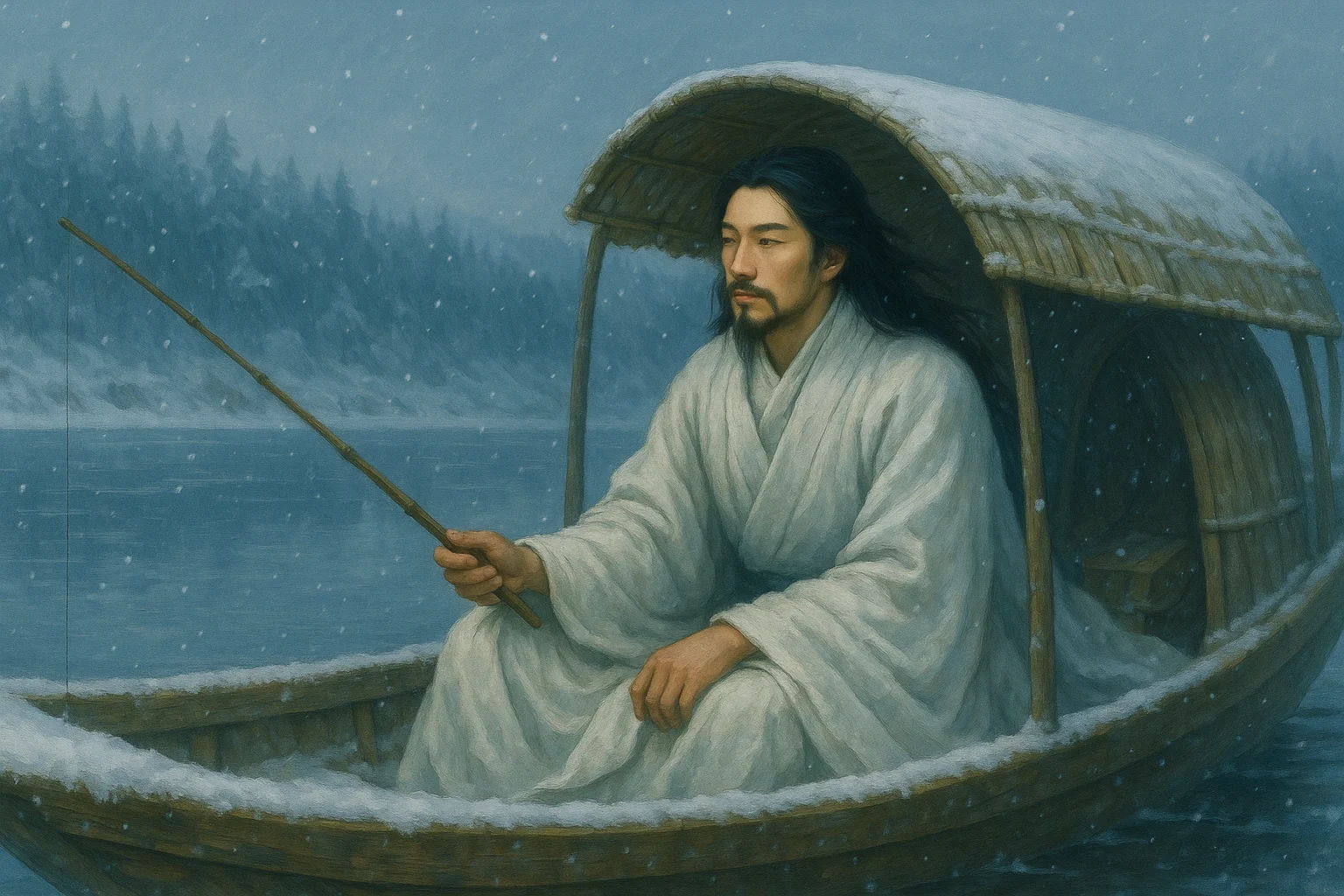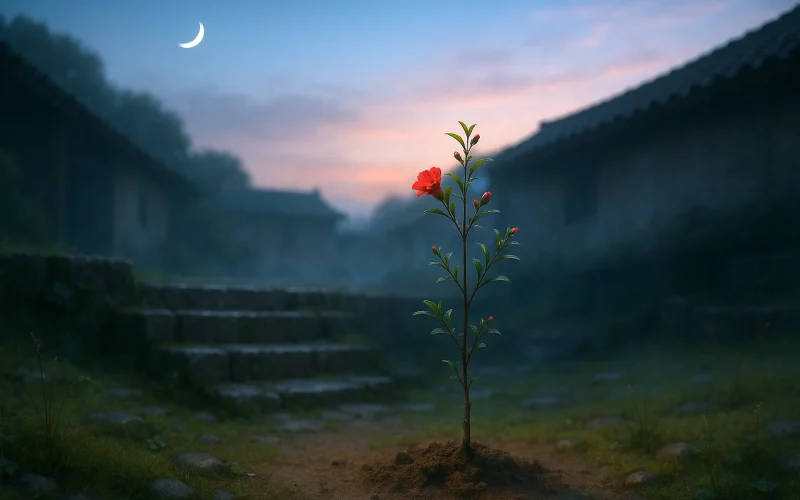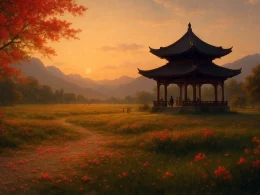Aloft, the early mume blooms flare,
Against Chu's azure sky so fair.
Night wind carries their fragrance wide,
Dawn frost paints their petals white with pride.
I'd send a branch ten thousand miles,
But endless peaks and streams beguile.
These cold flowers will fade and fall—
What comfort left for one so far in thrall?
Original Poem
「早梅」
柳宗元
早梅发高树,迥映楚天碧。
朔风飘夜香,繁霜滋晓白。
欲为万里赠,杳杳山水隔。
寒英坐销落,何用慰远客?
Interpretation
Composed during Liu Zongyuan's exile to Yongzhou following the failed Yongzhen Reform (805-806 CE), this poem transforms early plum blossoms into a triple allegory: of political steadfastness, intellectual isolation, and epistolary longing. Written in the sparse, resonant style that characterized Liu's exile poetry, it exemplifies his ability to compress Tang dynasty scholar-official trauma into botanical precision.
First Couplet: "早梅发高树,迥映楚天碧。"
Zǎo méi fā gāo shù, jiǒng yìng Chǔ tiān bì.
Premature plums crown high branches—
Jade flares against Chu's endless blue.
The opening juxtaposes vertical ambition ("high branches") with horizontal vastness ("endless blue"), mapping the poet's psychological coordinates. "Jade flares" (迥映) suggests both visual brilliance and political audacity—these blossoms dare to shine where they shouldn't, much like Liu's ill-fated reforms.
Second Couplet: "朔风飘夜香,繁霜滋晓白。"
Shuò fēng piāo yè xiāng, fán shuāng zī xiǎo bái.
North winds steal midnight fragrance—
Rime nurtures dawn's crystalline white.
Here, nature's violence becomes paradoxical nurturance: the very "north winds" (朔风) that threaten also disseminate the plum's scent, while killing frost (繁霜) intensifies its purity. This embodies Liu's exile ethos—persecution heightens moral clarity. The couplet's temporal movement ("midnight" to "dawn") hints at clandestine resistance.
Third Couplet: "欲为万里赠,杳杳山水隔。"
Yù wéi wànlǐ zèng, yǎoyǎo shānshuǐ gé.
I'd gift these blossoms a thousand miles—
But ranges sever all courier paths.
The failed gesture echoes Lu Kai's legendary plum-giving, a Han dynasty symbol of intellectual solidarity. "Ranges sever" (山水隔) physically maps the Tang court's ideological barriers—those who should receive this floral manifesto (fellow reformers) lie beyond reach.
Fourth Couplet: "寒英坐销落,何用慰远客?"
Hán yīng zuò xiāo luò, hé yòng wèi yuǎn kè?
Cold petals wilt untended—
What comfort for exiled souls?
The devastating conclusion inverts floral symbolism: blossoms that should represent resilience instead embody futility. The rhetorical question strikes at exile's cruel paradox—the very beauty meant to sustain becomes a reminder of mortality. "Untended" (坐销落) suggests political neglect as much as natural decay.
Holistic Appreciation
This poem, "Early Plum Blossoms," begins with the imagery of early spring, depicting plum blossoms bravely blooming amidst harsh winds and frost, symbolizing the poet's unwavering integrity and solitary refinement. The first half of the poem focuses on the scenery, employing a cold yet resilient tone to showcase the plum blossom's defiance and elegance. The latter half transitions into lyrical expression, conveying the poet's melancholy and helplessness after political setbacks through the futile attempt to send these blossoms to a distant friend.
Phrases like "northern winds" and "heavy frost" not only emphasize the harsh environment surrounding the plum blossoms but also mirror the poet's own political struggles. Lines such as "vast mountains and rivers lie between us" and "cold blossoms wither and fall" deepen the sense of longing for loved ones and the sorrow of unfulfilled ideals. The poem's conclusion carries both lament for life's circumstances and an implied self-encouragement and clarity, embodying Liu Zongyuan's unique aesthetic of "calm yet tenacious."
The poem's language is concise and pure, its structure meticulous, and its emotions restrained yet profound. Without excessive force or fervor, it naturally exudes strength, revealing the poet's deep and lofty spirit. Its style aligns with the tradition of Tao Yuanming and Meng Haoran—serene and understated yet infused with a somber gravity.
Artistic Merits
- Symbolism and Profound Meaning
Using "early plum blossoms" as a vehicle, the poem conveys the poet's ideals, making it a classic example of ancient object-chanting poetry. The plum blossoms are not merely natural scenery but a symbol of the poet's spiritual character. - Scene-Emotion Fusion and Progressive Layers
The poem begins with distant views, gradually unfolding into intimate emotions, and then returns to resolve in ideals. Its structure flows naturally, with emotions deepening layer by layer, achieving subtlety and depth. - Concise Language and Austere Dignity
The diction is plain and unadorned, yet refined and precise throughout, embodying Liu Zongyuan's characteristic cool and stern style, infused with profound thought and moral strength.
Insights
Liu Zongyuan's work uses the purity of early plum blossoms to symbolize his steadfast and independent spirit, expressing an unyielding resolve in the face of adversity. The poem teaches us to hold fast to our principles and maintain purity even in hardship; even when demoted or neglected, we should bloom defiantly like plum blossoms in the cold, refusing to drift with the tide. Though lines like "cold blossoms wither and fall—how can they comfort a distant friend?" carry sorrow, they also reveal a self-awareness and transcendent attitude. This spirit of "remaining undefeated in the depths" is the true reflection of Liu Zongyuan's character and a timeless force that transcends eras.
About the Poet

Liu Zongyuan (柳宗元, 773 - 819), a native of Yuncheng in Shanxi province, was a pioneering advocate of the Classical Prose Movement during China's Tang Dynasty. Awarded the prestigious jinshi degree in 793 during the Zhenyuan era, this distinguished scholar-official revolutionized Chinese literature with his groundbreaking essays. His prose works, remarkable for their incisive vigor and crystalline purity, established the canonical model for landscape travel writing that would influence generations. As a poet, Liu mastered a distinctive style of luminous clarity and solitary grandeur, securing his place among the legendary "Eight Great Masters of Tang-Song Prose" - an honor reflecting his enduring impact on Chinese literary history.












